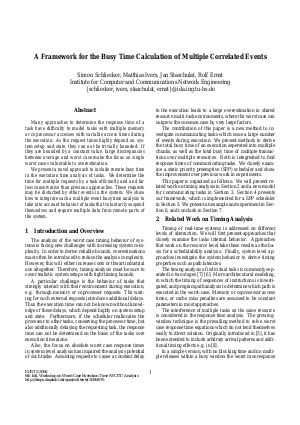A Framework for the Busy Time Calculation of Multiple Correlated Events
Authors Simon Schliecker, Matthias Ivers, Jan Staschulat, Rolf Ernst
-
Part of:
Volume:
6th International Workshop on Worst-Case Execution Time Analysis (WCET'06) (WCET 2006)
Part of: Series: Open Access Series in Informatics (OASIcs)
Part of: Conference: Workshop on Worst-Case Execution Time Analysis (WCET) - License:
 Creative Commons Attribution-NonCommercial-NoDerivs 3.0 Unported license
Creative Commons Attribution-NonCommercial-NoDerivs 3.0 Unported license
- Publication Date: 2006-08-23
File

PDF
OASIcs.WCET.2006.676.pdf
- Filesize: 122 kB
- 6 pages
Document Identifiers
Subject Classification
Keywords
- Response time analysis
- multiple memory accesses
- multiprocessor
- hard real-time
- busy time
Metrics
- Access Statistics
-
Total Accesses (updated on a weekly basis)
0Document
0Metadata
Abstract
Many approaches to determine the response time of a task have difficulty to model tasks with multiple memory or coprocessor accesses with variable access times during the execution. As the request times highly depend on system setup and state, they can not be trivially bounded. If they are bounded by a constant value, large discrepancies between average and worst case make the focus on single worst cases vulnerable to overestimation. We present a novel approach to include remote busy time in the execution time analysis of tasks. We determine the time for multiple requests by a task efficiently and and far less conservative than previous approaches. These requests may be disturbed by other events in the system. We show how to integrate such a multiple event busy time analysis to take into account behavior of tasks that voluntarily suspend themselves and require multiple data from remote parts of the system.
Cite As Get BibTex
Simon Schliecker, Matthias Ivers, Jan Staschulat, and Rolf Ernst. A Framework for the Busy Time Calculation of Multiple Correlated Events. In 6th International Workshop on Worst-Case Execution Time Analysis (WCET'06). Open Access Series in Informatics (OASIcs), Volume 4, pp. 1-6, Schloss Dagstuhl – Leibniz-Zentrum für Informatik (2006)
https://doi.org/10.4230/OASIcs.WCET.2006.676
BibTex
@InProceedings{schliecker_et_al:OASIcs.WCET.2006.676,
author = {Schliecker, Simon and Ivers, Matthias and Staschulat, Jan and Ernst, Rolf},
title = {{A Framework for the Busy Time Calculation of Multiple Correlated Events}},
booktitle = {6th International Workshop on Worst-Case Execution Time Analysis (WCET'06)},
pages = {1--6},
series = {Open Access Series in Informatics (OASIcs)},
ISBN = {978-3-939897-03-3},
ISSN = {2190-6807},
year = {2006},
volume = {4},
editor = {Mueller, Frank},
publisher = {Schloss Dagstuhl -- Leibniz-Zentrum f{\"u}r Informatik},
address = {Dagstuhl, Germany},
URL = {https://drops.dagstuhl.de/entities/document/10.4230/OASIcs.WCET.2006.676},
URN = {urn:nbn:de:0030-drops-6767},
doi = {10.4230/OASIcs.WCET.2006.676},
annote = {Keywords: Response time analysis, multiple memory accesses, multiprocessor, hard real-time, busy time}
}
